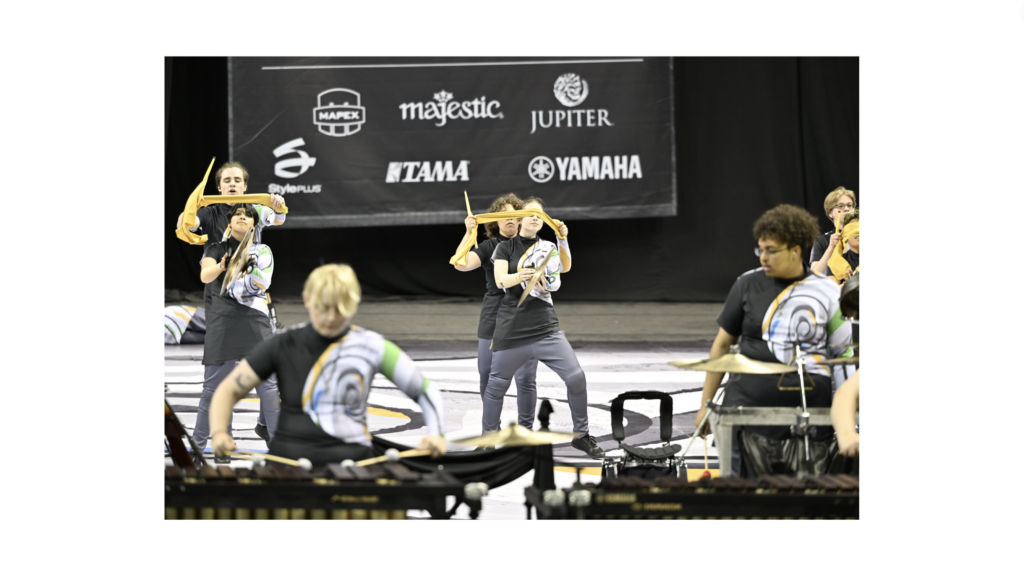By Eleni Batsios
Aaron Swick, director of Motor City Percussion, would say with a booming laugh that the organization hasn’t always been easy to run. He looks back at the past 20 years with a fondness that can only come out of hindsight – their obstacles and mishaps weren’t always cause for laughter. “The stress level would be skyhigh for me and the rest of the staff, we were always trying to figure things out,” said Swick.
Motor City’s first competitive season was in 2003, making it the oldest independent group in Michigan. Swick has been the director since that very first year, juggling his own marching season and a full time job along with the directorial duties at 20 years old. “We kind of had to schedule rehearsals around when I had to leave to go to work,” said Swick. “I wouldn’t have been able to run Motor City back then without the parents and staff.”

Swick learned a lot about his directorial style during the early days of Motor City. His fondest memory includes looking back to 2004, Motor City’s second competitive season, and when they had to travel from Detroit, Michigan to San Diego, California for WGI World Championships.
“We were an Independent A group at the time, and our dues for the season had doubled because of the cross country trip,” said Swick. “But, seeing a little group from Detroit on that WGI floor and seeing how far we made it, that’s what made it worth it for me. We didn’t have a lot of money back then, but the kids still had the biggest smiles on their faces when they performed.”
Tragedy struck Swick right before Motor City’s 2013 program when his brother died. “That put a lot of things in perspective for me,” Swick reflected. “At this point I had been directing for a decade, and to miss out on so many family moments because of band is a tough thing to face.”
Because of this, the staff decided to name their 2013 show Legacy, a beautiful homage to the legacy people leave behind when they sadly leave this world. “That show had a lot of firsts for us,” explained Swick. “It was our first time using a digitally printed floor, lighting effects, and we had a ton of new kids who had barely if ever played percussion.”
The Legacy season taught Swick the value of good work ethic and grit. Motor City had also lost their rehearsal space during this season, so every Friday members would be getting messages from Swick about where rehearsal was going to be that weekend. “We were seriously considering folding, or at least not being in open class,” said Swick. “We had already had auditions, but the stress level on staff and members was insane.”

Families and friends came together and donated money to put their loved and lost ones’ names printed on the floor. Swick was calling places every day to beg them to let Motor City rehearse and sleep in their space. Through outreach and hardwork, the season became the most successful Motor City season score-wise to date. “Those kids earned their success. They busted their humps harder than we had ever busted our humps before and they made it,” Swick said with his roaring laugh. In a season of adversity, Motor City prevailed.
This isn’t to say Swick hasn’t had enjoyable, less stressful times at Motor City. He prides himself on the community they have been able to create at the organization, both between members and staff. “My favorite part is the expression on everybody’s faces when we get to perform and get to have success,” said Swick. He enjoys that he has been able to mentor people: “If you walk away from Motor City only a little better at drums but ten times better at life, that’s a success to me.”

When asked to reflect on his 20 years of directing Motor City, Swick said the biggest lesson he learned was that groups have to be okay with always making adjustments. “You can never believe that the way you do something is the only way, that will be your downfall,” said Swick. “Hold each staff member accountable, mentor the younger staff, and make sure everyone feels ownership of the group.”
After all these years of experience, Swick has some wisdom to pass down to anyone who wants to start or maintain their own drumline: “Run and hide,” Swick joked. “Actually though, you have to have a home. You don’t need any big names on your staff, you don’t need equipment, everything else can be figured out if you have somewhere to rehearse and call a home.”
“Oh, and you have to be willing to work your tail off, both inside and outside of rehearsal,” Swick added.
He’s grateful to his staff members and the Motor City community, for allowing him to take a much needed step back. “My staff stands behind me and I stand behind them – it’s an interesting family we’ve created.” He can trust them to run rehearsal, write music, write staging, and produce a good show. “It’s honoring that they still want me around, and even more honoring that we’ve had so many people come through our organization,” added Swick.

